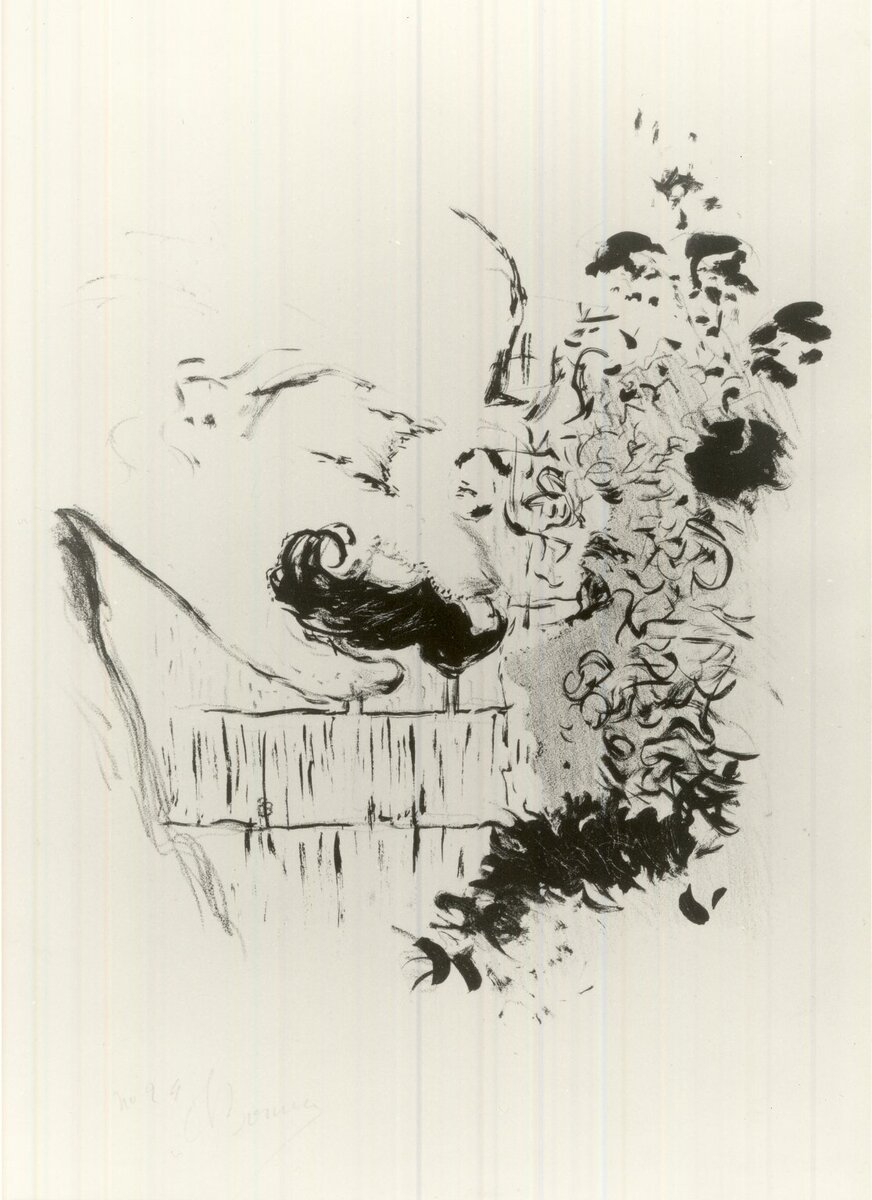“[An] example (is] that of the application of 'above' and 'below' to the earth. . .. I see well enough that I am on top; the earth is surely beneath me! (And don't smile at this example. We are indeed all taught at school that it is stupid to talk like that. But it is much easier to bury a problem than to solve it.)”
— Ludwig Wittgenstein, Philosophical Investigations
Pierre Bonnard’s The Conversation — a sketch or an unfinished working draft, I think
Language is marked by falls, by stalls between faltering and falling.
Translation theory originates in our irrevocable banishment from Eden.
All literary theory, interpretation, and critique follows from that seminal withdrawal.
What follows a fall is Commentary.
Taking translation theory as the originary for any discussion of language and textual interpretation, one can imagine why New Criticism fares badly when applied to texts that didn’t originate in English. New Criticism touches so little in translation. Imperiousness, in general, makes for limited readings.
Times have changed but those who need God’s language to be an unchanging law, preserved by the elect, continue their war against those who favor open access and multiplicity.
Some have said that the first “mass market translation” involved carrying the Septuagint from Hebrew into Greek at some point in the 3rd century BCE. Eventually, this Greek translation became more authoritative than its Hebrew source. Fast forward to 384 AD, when Eusebius Hieronymus (later Saint Jerome) created a new translation of the scriptures in Latin. Eschewing the official Greek, Hieronymus’ translation relied entirely on the Hebrew and Aramaic source text. The rage of the bishops followed. A furious Augustine of Hippo lambasted Hieronymus for dividing the faithful from within. For Augustine, this creation of an alternate sacred document would gnaw through the intestines of the Church.
History shuddered. Lava poured from the mouth of Etna. The Vulgate opened the doors to disaster by making the gospels accessible to speakers of Latin languages. More vulgarities were sure to follow. In 1522, Martin Luther published the New Testament in German. William Tyndale followed suit with an English version. Alas, in 1536, Tyndale was convicted of heresy, executed by strangulation, then burned at the stake. Burning his bones assured that Tyndale would not be permitted to rest in eternity. Sir Thomas More had expressed concern over Tyndale's English translation, but he missed Tyndale’s execution due to his own. More was beheaded on charges of treason three months prior.
The fall is a singular event yet also a season.
In Sympathy for the Traitor: A Translation Manifestation, Mark Polizotti takes translated texts as a form of collaboration. Language is not a clear end-point marked by a destination but a route with spaces, evocations, new roads, and rest stops dropped the route which alters what one receives or picks up while reading. For him, this complexity is a liberation: the translator is free to give up on equivalence and focus on encountering the text.
The translator “performs” the translation on paper.
Polizotti notes that an earlier meaning of translation referred to the act of transferring a holy relic from one place to another, or “else to carry a saintly figure to heaven without the intermediary of death.”
[At this point, a leaf falls next to my foot, as if to inaugurate the seasons of boots. I begrudge the beauty of all small things that seek to obscure what is true of winter, namely, the light’s early leavetaking.]
Recent Mormon schismatics lean on a concept of “translated bodies” involving the denial of corporeal death repackaged into a product for the cult of eschatology. Unlike Polizotti’s translation theory, these bodies have been “translated” by God across mediums. They are translated for the purpose of the end-times: time’s end is simultaneously a present and a desired destination to them.
This is why Lori and Chad Vallow support contemporary translation theories that obsess over the literal translation. The divinely-translated take themselves literally, and place their faith in the text to render language immaculate in the flesh.


